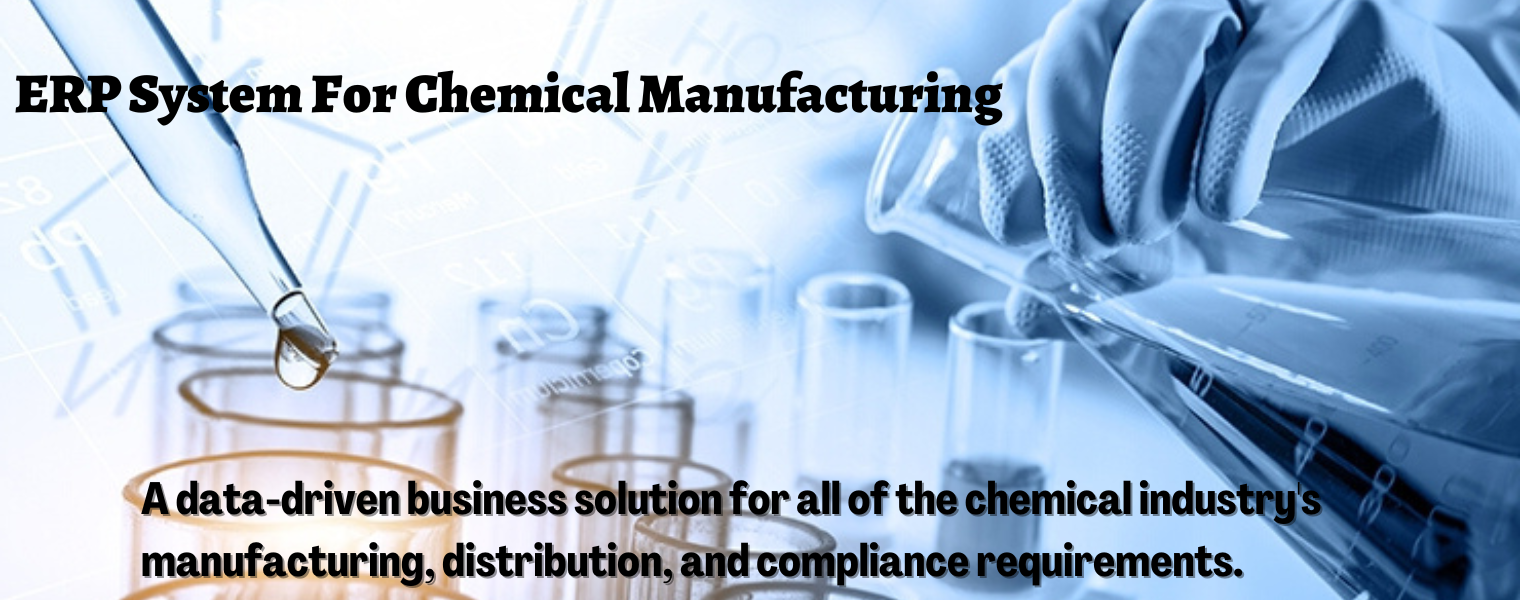
Chemical firms benefit from an effective Enterprise Resource Planning (ERP) system in many areas of their business operations, including procurement, production, supply chain, vendor management, aftermarket, and more.
You may effortlessly manage both your spending and inventory in a systematic manner with our excellent ERP systems. DoFort is a market-leading ERP system for the chemical industry that will carefully address inventory management and delivery planning while meeting your company's needs. Additionally, it aids in managing timely delivery with high-quality low prices and precise orders. The program is a fully integrated chemical ERP solution because it has all business analytics and customer resource management capabilities built into it. You can put certain strategies into practice and utilize cutting-edge ERP benefits to get dynamic results.
Perhaps the complexity of operations in your chemical manufacturing company has reached a stage where you need to make an investment in an ERP. Or perhaps your paint and coatings business has bought a rival, leaving you with the difficult task of combining two disparate infrastructures. Perhaps you need to replace your ink and dye manufacturing company's clunky, antiquated ERP system to increase productivity, have a better understanding of plant and management operations and utilize IoT.
Whatever category you fall under, finding an ERP System for chemical manufacturing that will help modernize and streamline operations, remove bottlenecks, and bring your manufacturing, sales, customer service, and management teams together on one approachable platform is the common goal shared by these scenarios
Regardless of the system you use, it should not only assist you in managing your organization but also help you reduce costs by boosting overall effectiveness. The intelligent application of current technology makes it feasible for higher efficiency, which leads to greater profitability
Technology may help promote sustainable goods, practices, and growth while also easing the ever-increasing complexity of the regulations and laws governing the chemical manufacturing business.
Integration of the management and plant systems
Process efficiency improvement
Increased real-time awareness of production yields and supply constraints
Getting rid of segregated data
A requirement for multi-level inventory tracking and monitoring
Desire to enhance quality control
Streamlining the handling of compliance regulations
Wishing for improved hazard analysis to avoid harm and downtime
Gaining more clarity on the differences in commodity pricing
To accelerate approvals and prevent paperwork bottlenecks, workflow management will be improved with various levels of work order reviews and approvals secured by electronic signatures.
Desiring greater understanding and traceability of the workflow cycle and having access to accurate, current data
Since raw materials are not always readily available, accessing them is difficult. Second, compared to Middle Eastern and South Asian nations, India has very high material costs. The absence of trained workers or disparities in manufacturing wages could be to blame for this.
For domestic chemical firms, access to depots, ports, inadequate infrastructure facilities, and the worst pipeline connectivity are major problems. The perfect supply of raw materials is severely hampered by these problems.
Another significant issue that contributes to the inadequate infrastructure is the electricity supply. Small and medium-sized chemical plants cannot afford captive power plants due to a lack of funding.
Chemicals are imported right now from low-cost production centers. India has experienced a significant reduction in import duties on a variety of products after joining the world trade organization.
The government has prohibited tariffs in order to enhance competitiveness and meet the nation's expanding demand for chemicals.
A severe labor shortage in the sector is reportedly having an impact on business productivity. The business must deal with lowered product quality, decreased production, constrained growth, and more. So, in order to increase productivity in the chemical manufacturing industry, businesses need qualified laborers, which can only be done with a strong human resources department on site.
Chemicals are imported right now from low-cost production centers. India has experienced a significant reduction in import duties on a variety of products after joining the world trade organization.
Because there are so many different chemicals and products being used, managing the stockpiles is another difficulty that the chemical business faces. Our chemical industry ERP software is useful since it makes use of data elements including expiration dates, quality control data, and traceability data. Additionally, shipping and warehouse data are loaded into the software to enable smooth management of stock requirements. The entire procedure may be automated by ERP, which makes it hassle-free for the business.
ERP software supports both product innovation and smooth overall manufacturing process management. Our manufacturing ERP software collects information from every stage of the production process and feeds it with data from research and development, making it considerably more successful at predicting future demand and product requirements.
The management of formulations is essential to the production of chemicals. It's crucial to keep track of the number of raw materials they have accessible and how much would be needed to satisfy their sales projection. Our chemical industry ERP software makes sure that these crucial processes don't need manual involvement. Adjustments, returns, and product cancellations will be significantly quicker and simpler as a result.
ERP for the chemical manufacturing business helps to improve supply chain efficiency and makes overall supply chain administration considerably simpler. The raw resources are managed intelligently, which lowers overall costs and waste and boosts industry profitability.
Since all departments within the industry use the ERP software, several functionalities, including material procurement, catalog creation and development, invoicing, contract management and development, and vendor monitoring and assessment, are better connected with the key partners. By achieving this level of competence, the business is able to collaborate more effectively and build deeper bonds with its suppliers, which helps with better purchasing and lower procurement costs.
The summary of the advantages our chemical industry ERP software offers businesses may prove enlightening in helping you decide whether to use it successfully in your company and, as a result, help you increase profits through better-managed processes.
Welcome to DoFort !